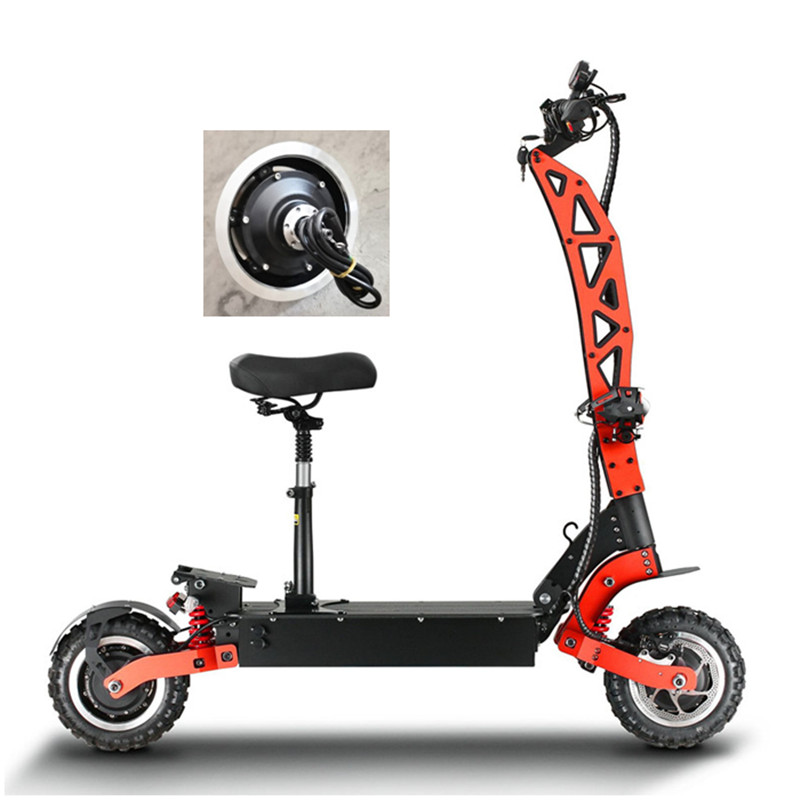Description
Pink Adult Electric Scooter
Electric Push Scooters For Adults
Electric Scooter For Heavy Adults Off Road
| Parameter | |
| Frame | High strength aluminum alloy 6061, surface paint |
| Forking forks | One forming front fork and rear fork |
| Electric machinery | 11 “72V 10000W brushless toothed high speed motor |
| Controller | 72V 70SAH*2 tube vector sinusoidal brushless controller (mini type) |
| Battery | 72V 40AH-45AH module lithium battery (Tian energy 21700) |
| Meter | LCD speed, temperature, power display and fault display |
| GPS | Location and telecontrol alarm |
| Braking system | After one disc, does not contain harmful substance, in compliance with international environmental requirements |
| Brake handle | Forging brake of aluminum alloy with power breaking function |
| Tyre | ZhengXin tire 11 inch |
| Headlight | LED lenticular bright headlights and driving lights |
| Maximum speed | 110km |
| Extension mileage | 115-120km |
| Motor | 5000watt per piece |
| Wheel | 11inch |
| Net weight and gross weight | 54kg/63kg |
| Product size | L* w* h: 1300*560*1030 (mm) |
| Packaging size | L* w* h: 1330*320*780 (mm) |









With the rapid development of technology, electric vehicles have gradually become a focus of public attention. Electric vehicles not only have environmentally friendly features such as zero emissions and low noise, but they can also effectively reduce energy consumption and reduce dependence on fossil resources. As a result, more and more countries and businesses are starting to invest in research and production of electric vehicles, in order to take the lead in the future transportation field.
The development of electric vehicles is not possible without advances in battery technology. Currently, there are mainly two types of electric vehicle batteries in the market: lithium-ion batteries and solid-state batteries. Lithium-ion batteries have a higher energy density and longer service life, and are currently the mainstream battery technology for electric vehicles. However, with the popularization of electric vehicles, the resource scarcity and recycling problem of lithium-ion batteries are becoming increasingly prominent. To solve this problem, researchers are exploring new battery technologies, such as solid-state batteries. Solid-state batteries have higher energy density, faster charging speeds, and longer service lives, and are seen as the ideal battery technology for electric vehicles in the future.In addition to battery technology advancements, the charging infrastructure for electric vehicles has also been rapidly developing. Currently, many charging stations and charging pads have been established around the world, providing convenient charging services for electric vehicles. Furthermore, some governments and regions have also implemented corresponding policies to encourage the purchase and use of electric vehicles. For example, the Chinese government has proposed a “Third Five-Year New Energy and Environmental Transportation Development Plan,” which aims to achieve a sales ratio of 10% for new energy and environmental vehicles by 2020.However, the development of electric vehicles still faces many challenges. Firstly, battery costs remain high, resulting in higher prices for electric vehicles compared to gasoline-powered vehicles. Secondly, the range of electric vehicles is still limited, especially in cold temperatures. In addition, the charging time for electric vehicles is relatively long, which can cause some inconvenience to users. To address these issues, governments, businesses, and research institutions need to increase their research and development investments, promote innovation and breakthroughs in electric vehicle technology.In summary, electric vehicles, as an important direction for the future of transportation, have become a global research hot spot. With the continuous progress of battery technology and charging infrastructure, electric vehicles will gradually overcome existing challenges and achieve more widespread application. At the same time, governments, businesses, and research institutions need to strengthen cooperation, work together to promote the development of the electric vehicle industry, and create a more green and sustainable future for humanity.In the 21st century, electric vehicles have become an important part In the 21st century, electric vehicles have become an important part of the global automotive industry. With the continuous development of technology, the performance and efficiency of electric vehicles are also improving, providing consumers with more choices. However, the development of electric vehicles is also facing some challenges, including limitations in battery technology, inadequate charging infrastructure, and consumer acceptance.Firstly, battery technology is one of the key technologies for the development of electric vehicles. Currently, electric vehicles mainly use lithium-ion batteries as their power source. Although lithium-ion batteries have advantages over other types of batteries in terms of energy density and cycle life, there are still some issues such as high cost, safety concerns, and environmental impacts. Therefore, researchers have been working hard to find new battery technologies to improve the performance of electric vehicles and reduce production costs. For example, new battery technologies such as solid-state batteries, metal-air batteries, and graphene batteries have made certain breakthroughs and are expected to be put into practical application in the next few years.Secondly, charging infrastructure is a key factor in the popularization of electric vehicles. At present, the number of charging piles worldwide is still far from meeting the demand for electric vehicles. This not only limits the range of electric vehicle use but also affects consumer purchasing intentions. To address this issue, governments and relevant companies around the world are increasing investment in charging infrastructure construction. For example, the Chinese government has proposed the “13th Five-Year Plan,” which plans to build more than five million charging piles nationwide by 2020. In addition, some well-known international companies such as Tesla, BMW, and Audi are actively investing in building charging infrastructure to promote the popularization of electric vehicles.Finally, consumer acceptance plays a key role in the development of electric vehicles. Although electric vehicles have clear advantages in terms of environmental protection and energy conservation, due to factors such as higher prices, shorter ranges, and inconvenient charging, many consumers still hold a wait-and-see attitude towards electric vehicles. To increase consumer acceptance, automakers are working to reduce the production costs of electric vehicles and improve product performance. In addition, governments are encouraging consumers to purchase electric vehicles through policies such as subsidies and tax exemptions. With the gradual implementation of these measures, it is believed that electric vehicles will be more widely popularized in the future.
In conclusion, as a green and environmentally friendly means of transportation, electric vehicles have great potential for development. However, to achieve widespread popularity of electric vehicles, a series of technical and market obstacles still need to be overcome. Only through continuous innovation and effort can electric vehicles truly become the mainstream mode of transportation in the future.







